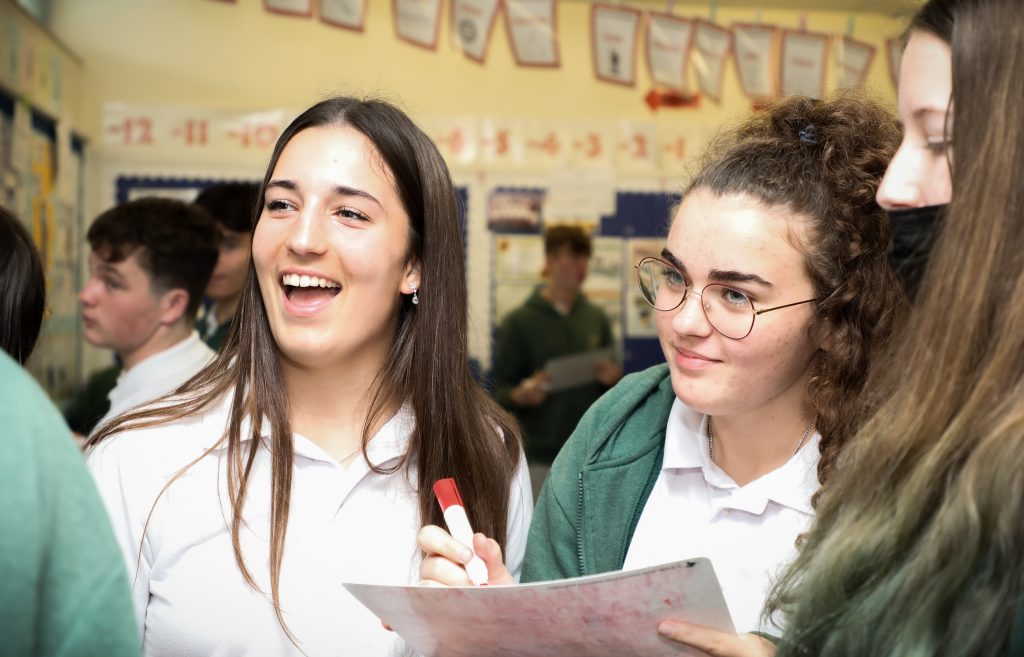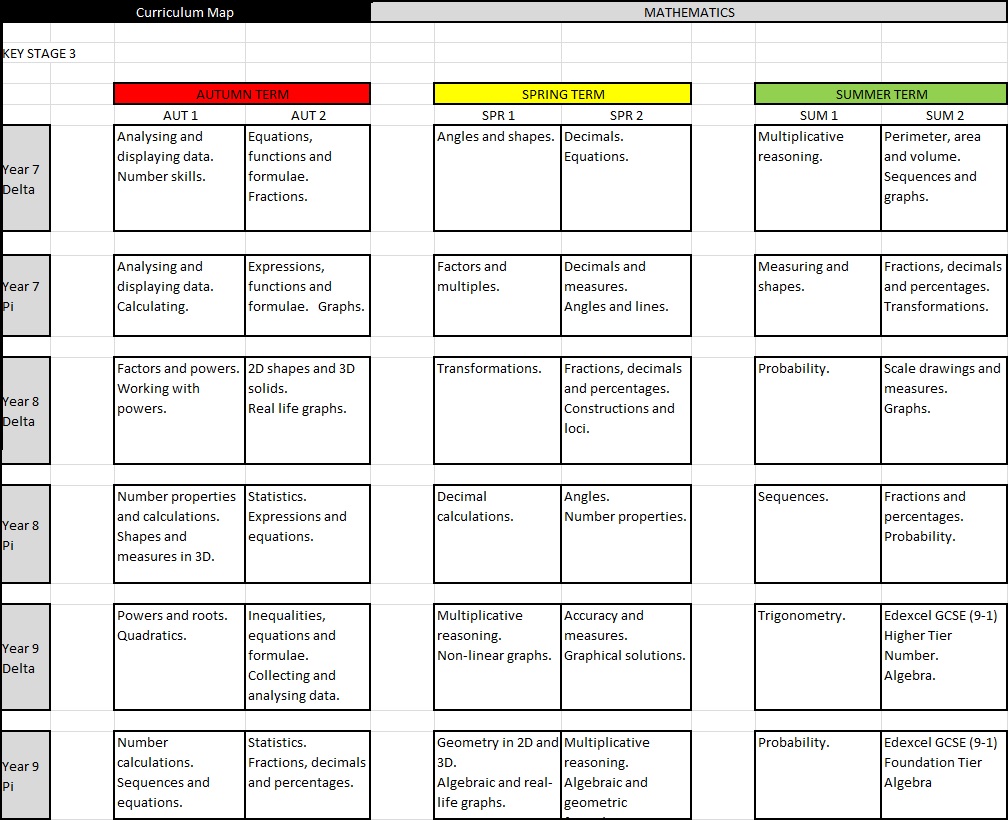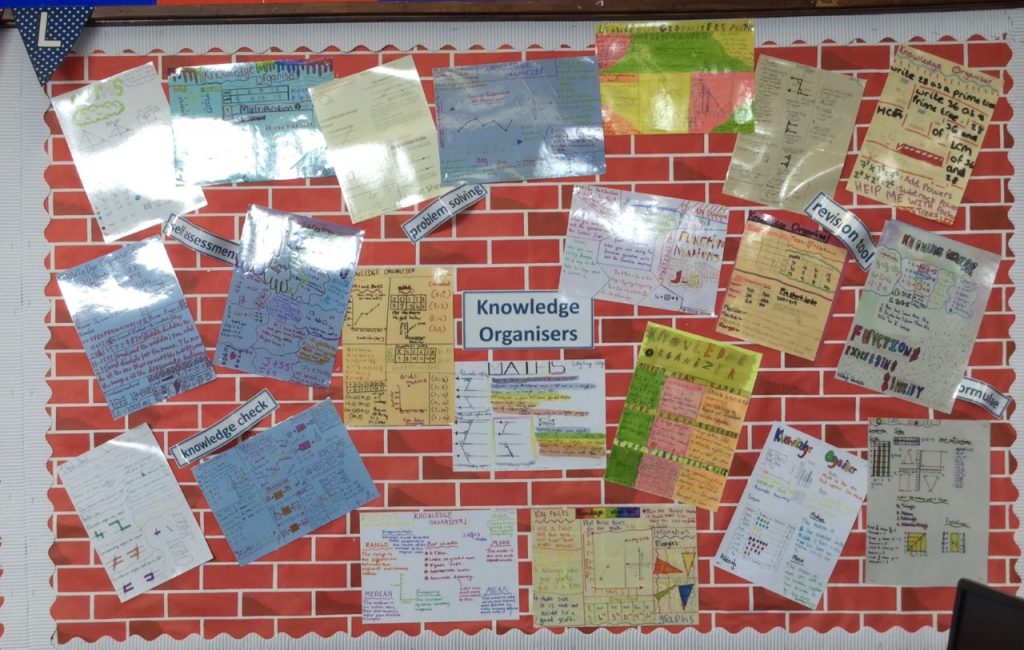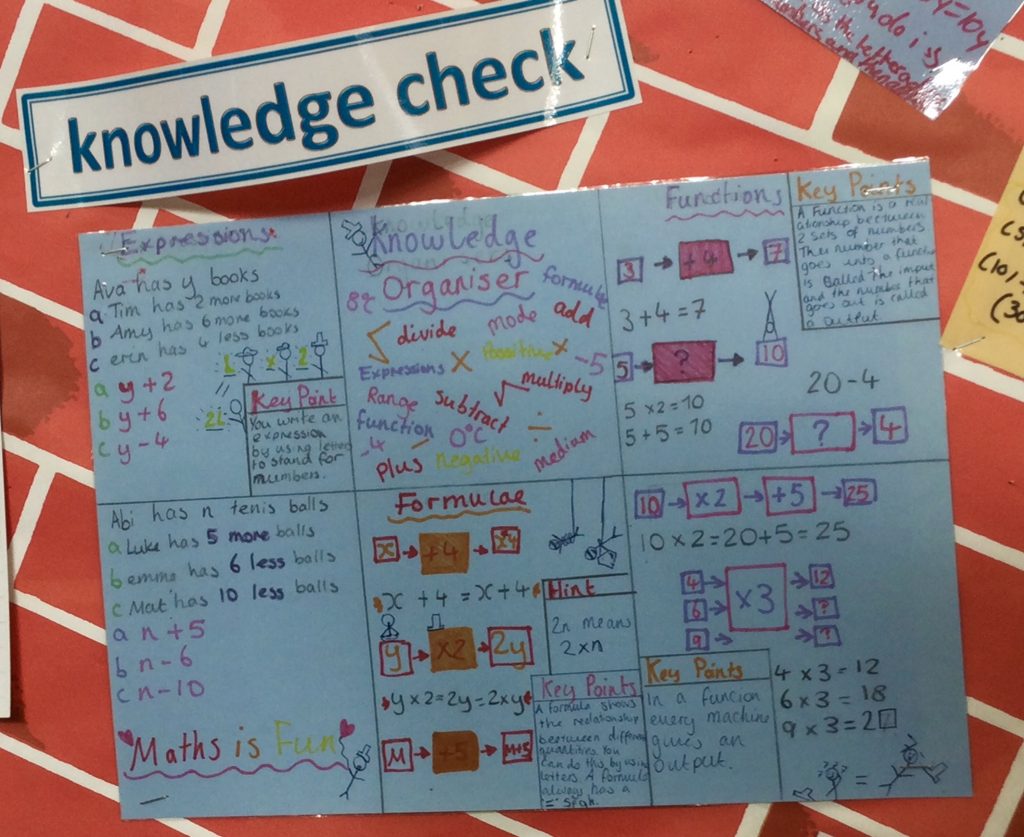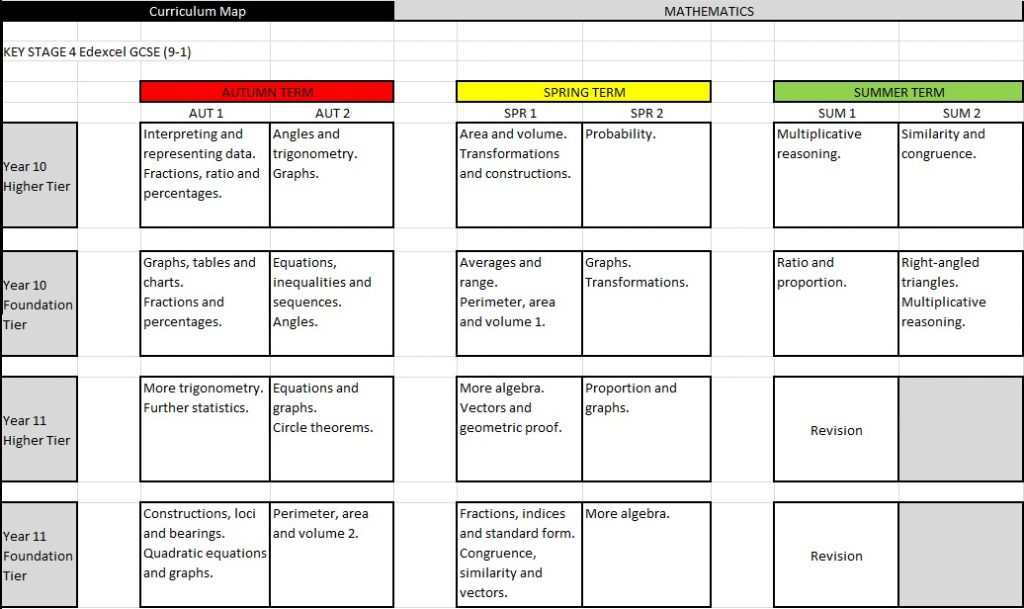“Provides a foundation for understanding the world, the ability to reason mathematically, an appreciation of the beauty and power of mathematics, and a sense of enjoyment and curiosity about the subject.”
The Mathematics curriculum covers more than just basic calculations. Students, according to ability, will learn important topics including statistics, fractions, percentages and probability, formulae, algebra and analysing data. The ‘My Maths’ website is a learning aid used by the school to help students develop their mathematical skills. Learn about the Maths curriculum and how homework is set in detail below:
Year 7
Key Words
Term 1 |
| Students will follow different pathways according to their KS2 ability.
Securing: Analysing and displaying data, Calculating, Expressions, functions and formulae & Graphs Mastery: Analysing and displaying data, Number skills, Expressions, functions and formulae & Decimals and measures Excelling: Analysing and displaying data, Number skills, Equations, functions and formulae & Fractions |
| Homework: Students will be set homework twice per week. This will be a variety of activities from research, worksheets, mymaths online homework etc. |
| How to help: The My Maths website www.mymaths.co.uk The school pays for individual student access to having website as it has PowerPoint’s for every maths topic. The students are set relevant tasks on the website. |
Term 2 |
| Students will follow different pathways according to their KS2 ability.
Securing: Factors and multiples, Decimals and measures & Angles and lines Mastery: Fractions, Probability & Ratio and proportion Excelling: Angles and shapes, Decimals & Equations |
| Homework: Students will be set homework twice per week. This will be a variety of activities from research, worksheets, mymaths online homework etc. |
| How to help: The My Maths website www.mymaths.co.uk The school pays for individual student access to having website as it has PowerPoint’s for every maths topic. The students are set relevant tasks on the website. |
Term 3 |
| Students will follow different pathways according to their KS2 ability.
Securing: Factors and multiples, Decimals and measures & Angles and lines. Mastery: Fractions, Probability & Ratio and proportion Excelling: Angles and shapes, Decimals & Equations |
| Homework: Students will be set homework twice per week. This will be a variety of activities from research, worksheets, mymaths online homework etc. |
| How to help: The My Maths website www.mymaths.co.uk The school pays for individual student access to having website as it has PowerPoint’s for every maths topic. The students are set relevant tasks on the website. |
Year 8
Key Words
Term 1 |
| Students will follow different pathways according to their KS2 ability.
Securing: Number properties and calculations, Shapes and measures in 3D, Statistics & Expressions and equations Mastery: Number, Area and volume, Statistics, graphs and charts & Expressions and equations Excelling: Factors and powers, Working with powers, 2D shapes and 3D solids & Real-life graphs |
| Homework: Students will be set homework twice per week. This will be a variety of activities from research, worksheets, mymaths online homework etc. |
| How to help: The My Maths website www.mymaths.co.uk The school pays for individual student access to having website as it has PowerPoint’s for every maths topic. The students are set relevant tasks on the website. |
Term 2 |
| Students will follow different pathways according to their KS2 ability.
Securing: Decimal calculations, Angles & Number properties Mastery: Real-life graphs, Decimals and ratio & Lines and angles Excelling: Transformations, Fractions, decimals and percentages & Constructions and loci |
| Homework: Students will be set homework twice per week. This will be a variety of activities from research, worksheets, mymaths online homework etc. |
| How to help: The My Maths website www.mymaths.co.uk The school pays for individual student access to having website as it has PowerPoint’s for every maths topic. The students are set relevant tasks on the website. |
Term 3 |
| Students will follow different pathways according to their KS2 ability.
Securing: Sequences, Fractions and percentages & Probability Mastery: Calculating with fractions, Straight-line graphs & Percentages, decimals and fractions Excelling: Probability, Scale drawings and measures & Graphs |
| Homework: Students will be set homework twice per week. This will be a variety of activities from research, worksheets, mymaths online homework etc. |
| How to help: The My Maths website www.mymaths.co.uk The school pays for individual student access to having website as it has PowerPoint’s for every maths topic. The students are set relevant tasks on the website. |
Year 9
Key Words
Term 1 |
| Students will follow different pathways according to their KS2 ability.
Securing: Number calculations, Sequences and equations, Statistics & Fractions, decimals and percentages Mastery: Indices and standard form, Expressions and formulae, Dealing with data & Multiplicative reasoning Excelling: Powers and roots, Quadratics, Inequalities, equations and formulae & Collecting and analysing data |
| Homework: Students will be set homework twice per week. This will be a variety of activities from research, worksheets, mymaths online homework etc. |
| How to help: The My Maths website www.mymaths.co.uk The school pays for individual student access to having website as it has PowerPoint’s for every maths topic. The students are set relevant tasks on the website. |
Term 2 |
| Students will follow different pathways according to their KS2 ability.
Securing: Geometry in 2D and 3D, Algebraic and real-life graphs & Multiplicative reasoning Mastery: Constructions, Equations, inequalities and proportionality &Circles, Pythagoras and prisms Excelling: Multiplicative reasoning, Non-linear graphs & Accuracy and measures |
| Homework: Students will be set homework twice per week. This will be a variety of activities from research, worksheets, mymaths online homework etc. |
| How to help: The My Maths website www.mymaths.co.uk The school pays for individual student access to having website as it has PowerPoint’s for every maths topic. The students are set relevant tasks on the website.
The students will all be given a Key Stage 3 MATHSWATCH CD which contains video clip demonstrations of all of the topics on the Key Stage 3 curriculum and also some very useful worksheets, with answers so that they can test their knowledge on any topic. |
Term 3 |
| Students will follow different pathways according to their KS2 ability.
Securing: Algebraic and geometric formulae, Probability & Polygons and transformations Mastery: Sequences and graphs, Probability & Comparing shapes Excelling: Graphical solutions, Trigonometry & Mathematical reasoning |
| Homework: Students will be set homework twice per week. This will be a variety of activities from research, worksheets, mymaths online homework etc. |
| How to help: The My Maths website www.mymaths.co.uk The school pays for individual student access to having website as it has PowerPoint’s for every maths topic. The students are set relevant tasks on the website.
The students will all be given a Key Stage 3 MATHSWATCH CD which contains video clip demonstrations of all of the topics on the Key Stage 3 curriculum and also some very useful worksheets, with answers so that they can test their knowledge on any topic. |
Year 10
Key Words
Term 1 |
| Edexcel GCSE (9-1)
Higher Tier: Number, Algebra, Interpreting and representing data & Fractions, ratio and percentages Foundation Tier: Number, Algebra, Graphs, tables and charts & Fractions and percentages |
| Homework: Homework is set twice a week however some mock exam papers may also be set for additional revision in Y11. |
| How to help: Edexcel GCSE (9-1). The My Maths website www.mymaths.co.uk. The Booster Packs are very useful for extending mathematics learning and revision. The Mathswatch CD Rom issued in Year 11. |
Term 2 |
| Edexcel GCSE (9-1)
Higher Tier: Number, Angles and trigonometry, Graphs & Area and volume. Foundation Tier: Equations, inequalities and sequences, Angles, Averagres and range & Perimeter, area and volume 1. |
| Homework: Homework is set twice a week and some mock exam papers may also be set for additional revision in Y11. |
| How to help: Edexcel GCSE (9-1). The My Maths website www.mymaths.co.uk. The Booster Packs are very useful for extending mathematics learning and revision. The Mathswatch CD Rom issued in year 11. |
Term 3 |
| Edexcel GCSE (9-1)
Higher Tier: Number, Transformations and constructions, Equations and inequalities, Probability & Multiplicative reasoning Foundation Tier: Graphs, Transformations, Ratio and proportion, Right-angled triangles & Probability |
| Homework: Homework is set twice a week however some mock exam papers may also be set for additional revision in Y11. |
| How to help: Edexcel GCSE (9-1). The My Maths website www.mymaths.co.uk. The Booster Packs are very useful for extending mathematics learning and revision. The Mathswatch CD Rom issued in Year 11. |
Year 11
Key Words
Term 1 |
| Edexcel GCSE (9-1)
Higher Tier: Similarity and congruence, More Trigonometry, Further statistics, Equations and graphs & Circle theorems Foundation Tier: Multiplicative reasoning, Constructions, loci and bearings,Quadratic equations and graphs & Perimeter, area and volume 2 |
| Homework: Homework is set twice a week and some mock exam papers may also be set for additional revision in Y11. The homework is focused on past papers and from November onwards past papers are issued. |
| How to help: Edexcel GCSE (9-1). My Maths (online resources). The Booster Packs are very useful for extending mathematics learning and revision. The students will all be given a MATHSWATCH CD which contains video clip demonstrations of all of the topics on the GCSE paper and also some very useful worksheets, with answers so that they can test their knowledge on any topic. From the October half term there will be weekly after school revision sessions. |
Term 2 |
| Edexcel GCSE (9-1)
Higher Tier: Vectors and geometric proof & proportion and graphs Foundation Tier: Fractions, indices and standard form, Congruence, similarity and vectors & More algebra Throughout the rest of Year 11 we complete a practice paper every two weeks. This is then teacher marked and students are then set three areas for improvement. These will be worked on before the next paper is sat two weeks later. |
| Homework: Homework is set twice a week however some mock exam papers may also be set for additional revision in Y11. The homework is now more focused on past papers and from November onwards past papers are issued. |
| How to help: Edexcel GCSE (9-1). The My Maths website www.mymaths.co.uk The Booster Packs are very useful for extending mathematics learning and revision. The students will all be given a MATHSWATCH CD which contains video clip demonstrations of all of the topics on the GCSE paper and also some very useful worksheets, with answers so that they can test their knowledge on any topic. From the October half term there will be weekly after school revision sessions. |
GCSE Mathematics (Edexcel GCSE 9-1) |
| This course is based on students who did not achieve a level 4 or wish to improve upon their previous year 11 grade due to further education requirements. |
Students learn about the following areasNumber, Algebra, Ratio, proportion and rates of change, Geometry and measures, Probability and Statistics |
| At KRS we follow the Edexcel Boards’ Specification GCSE (9-1) which has been designed to allow a holistic approach to teaching and assessment. Each paper assesses all assessment objectives and content, with three units each worth 33 1/3 % of the final marks. Each paper is also ramped in level of difficulty to give students a starting point in each question and leads up to stretching the most able.
Elements of functional mathematics have been embedded into the specifications and assessments. This introduction ensures that students have the skills they need to use mathematics in real life contexts. If a student has entered KRS from another school, it is possible to sit linear GCSEs from another examining board. Three written papers of 1 hour 30 minutes each. Paper 1 is non calculator; Paper 2 & 3 is calculator. |
| Homework: As students will have taken the GCSE in Year 11, the vast majority of the homework will be the completion of past papers |
| How to help: There are plenty of websites available such as mymaths.co.uk, but also use the Mathswatch CD rom we issue to students. |
A Level Mathematics (Edexcel 8MA0 & 9MA0) |
| The AS course cover three different areas of mathematics, Pure Mathematics, Statistics and Mechanics. |
| AS Mathematics consists of:
Pure Mathematics 1 (written examination 2 hr, 66.66%, 100 marks) This is a stand-alone qualification and will not contribute towards the A2 level. The A2 course covers the same three different areas of mathematics, but will examine the same content as the AS course as well as extending each of these areas of mathematics. A2 Mathematics consists of: Pure Mathematics 1 (written examination 2 hr, 33.33%, 100 marks) Statistics and Mechanics ( written examination 2 hr, 33.33%, 100 marks) |
| Students learn about the following areas
|
| Homework: This will depend upon where the class are up to within the syllabus, but it is usually either Mixed Review Exercises or Past Paper Questions |
| How to help: Websites available such as mymaths.co.uk, examsolutions.co.uk or khanacademy.org |
| A Level Further Mathematics (Edexcel 8FM0 & 9F M0) |
| Further Mathematics is an A Level in its own right. Although some of the maths you would study is complex and demanding, generally Further Maths means “More Maths” and not necessarily “Harder Maths”. Further Maths A Level is an opportunity to deepen your knowledge and understanding of topics you are already familiar with as well as an opportunity to study different areas of Mathematical importance. |
| Students will complete both their Maths AS and Further Maths AS levels in Year 12. They would then choose whether to continue with both or only continue with Mathematics. If both, they would then complete their Maths A2 level and Further Mathematics A2 level in Year 13.
The most likely modules would be: Y12 Further Pure Mathematics 1 (written examination 1 hr 30 min. 50%, 75 marks) Y12 Decision Mathematics (written examination 1 hr 30 min. 50%, 75 marks) Yet again this AS course is a stand-alone qualification and does not contribute to the A2 qualification. Y13 Further Pure Mathematics 1 (written examination 1 hr 30 min. 25%, 75 marks) Y13 Further Pure Mathematics 2 (written examination 1 hr 30 min. 25%, 75 marks) Y13 Further Statistics 1 (written examination 1 hr 30 min. 25%, 75 marks) Y13 Further Decision 1 or Further Mechanics 1 (written examination 1 hr 30 min. 25%, 75 marks) |
| Students learn about the following areas For FP1 students will cover topics such as series, complex numbers, matrices & proof, for FP2: first order and second order differential equations, further series and complex numbers and for FP3: further matrices, differentiation, integration and coordinate systems, vectors, hyperbolic functions. |
| Homework: This will depend upon where the class are up to within the syllabus, but it is usually either Mixed Review Exercises or Past Paper Questions |
| How to help: Websites available such as mymaths.co.uk, examsolutions.co.uk or khanacademy.org |

